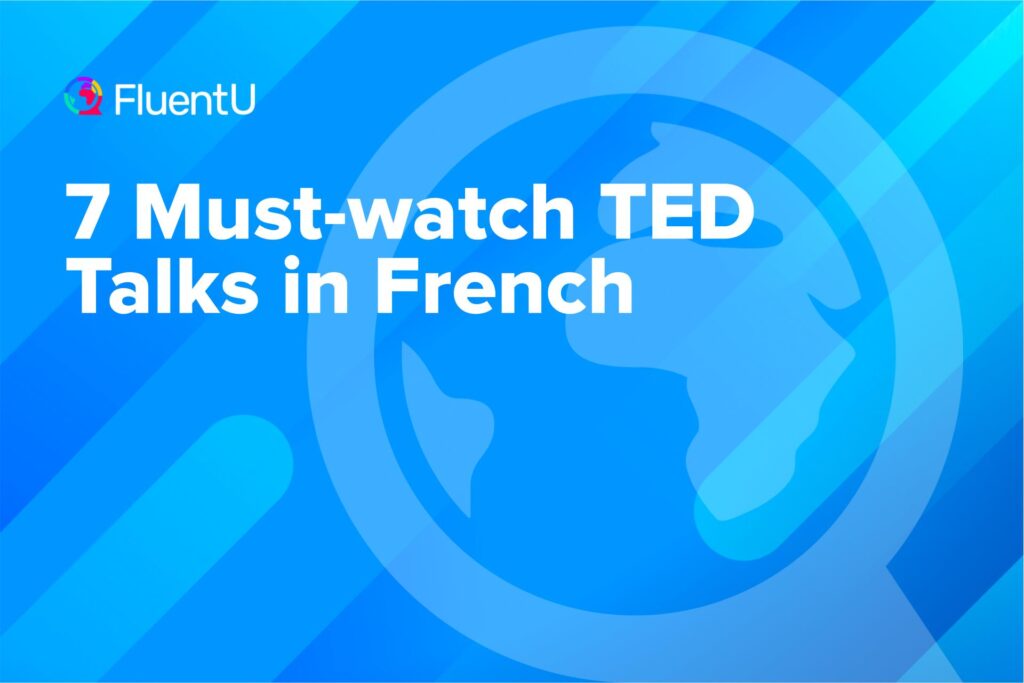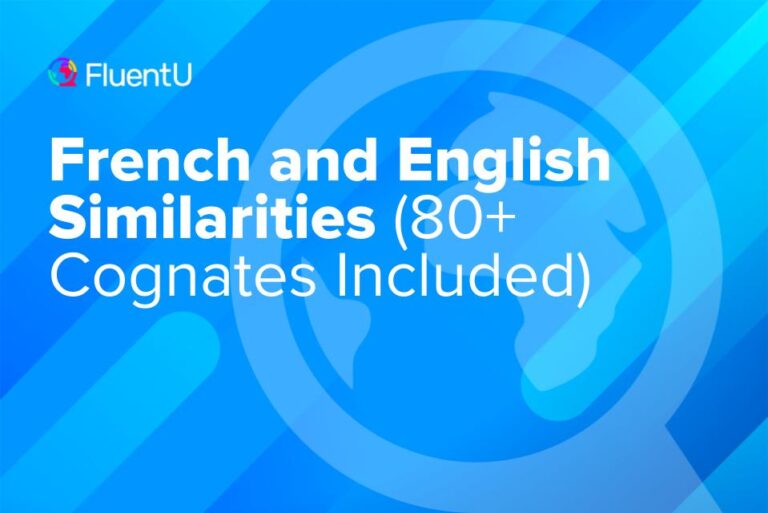Contents
- 1. “Alors on danse”
- 2. “Voyage entre deux inspirations”
- 3. “Peut-on penser l’origine de l’Univers ?”
- 4. “Un polyglotte sommeille en vous”
- 5. “Journalisme humanitaire, au-delà des clichés”
- 6. “Protéger les océans pour un autre anthropocène”
- 7. “La thérapie cellulaire, avenir de la médecine ?”
- How to Use TED Talks to Learn French
- And One More Thing...
7 Must-watch TED Talks in French

Download: This blog post is available as a convenient and portable PDF that you can take anywhere. Click here to get a copy. (Download)
1. “Alors on danse”
English title: “Then we dance”
If you’re a music-loving French learner, check out this TED Talk. Stromae is an international music star with an interesting perspective. His talk is about 80% English and he often repeats himself in English and then French, making this a great video for beginners.
In the video, Stromae gives us insight into how electronic music is made and where he draws his lyric inspiration from. He breaks down each layer of the song to show how they all fit together and then gives a performance at the end.
You’ll hear phrases such as terre à terre (down to earth), envie de danser (feel like dancing) and Est-ce que vous êtes prêts à repartir ? (Are you ready to go again?).
2. “Voyage entre deux inspirations”
English title: “Journey between two inspirations”
In this TED Talk, Guillaume Néry gives us a glimpse into the world of freediving, discussing the sport’s physical and psychological challenges. He also talks about the beauty of freediving and learning to be at ease underwater.
The TED Talk includes footage from Néry’s record freedive, his training and other diving experiences. A lot of the language will be quite complicated for a beginner in French, but there are still plenty of opportunities to learn here.
You’ll hear some French-English cognates such as profonde (deep or profound), intense (intense) and effet (effect). He also uses some vocabulary related to the body like les poumons, le cœur et le cerveau (the lungs, the heart and the brain).
3. “Peut-on penser l’origine de l’Univers ?”
English title: “Can we conceive the origin of the universe?”
Étienne Klein presents a very interesting talk on various theories about the universe, delving into whether the origin of the universe is a scientific or a spiritual idea. He progresses through a logical argument, presenting both viewpoints.
Klein uses some visuals, but this is mainly a lecture rather than a demonstration. He uses a lot of academic language and unusual vocabulary due to the nature of the subject, so this talk is best for intermediate and advanced learners.
You’ll hear some advanced verbs including greffer (to graft/transplant), tenter (to attempt), s‘éloignent ([they] move away) and aperçoit ([he/she] perceives). If you enjoy this talk, Klein has a book on the same topic.
4. “Un polyglotte sommeille en vous”
English title: “A polyglot lies dormant in you”
Sébastian Roger de Nuñez is a hyper-polyglot who speaks more than 10 languages, and his TED Talk serves as inspiration for language learners. He talks about why we learn other languages, the relationships between languages and useful learning methods.
There’s some complex language, including some French idioms. For example, Nuñez says “je n’ai pas jeté l’éponge,” which is the French equivalent of “I haven’t thrown in the towel,” but uses “sponge” instead of “towel.”
You’ll also hear some beginner and intermediate phrases such as j’estime (I believe), j’ai su retenir (I managed to remember) and en tendant bien l’oreille (listening carefully).
5. “Journalisme humanitaire, au-delà des clichés”
English title: “Humanitarian journalism, beyond clichés”
Élodie Vialle presents a very compelling talk on the subject of humanitarian journalism. She discusses how the media can retain the dignity of those impacted by poverty by eliminating stereotypes and post-colonial thinking.
You’ll hear some useful phrases such as gagner sa vie (to earn a living), regardez-le bien (look at it carefully) and ça tombe à l’eau, which translates literally to “it falls in the water” but means “it falls through.”
Some more advanced phrases used include mais force est de constater (but it should be noted) and jette en pâture, which literally means “throws it to pasture” but is equivalent to the phrase “thrown to the lions.”
6. “Protéger les océans pour un autre anthropocène”
English title: “Protecting the oceans for another Anthropocene”
César Harada presents a fascinating talk, briefly explaining three major threats to ocean life and then guiding us through his team’s revolutionary work to build technology to help save the oceans.
Harada uses videos, prototypes and visual aids to explain his technology and crafts a compelling story around his drive to save the oceans. There’s plenty to watch here; you might even forget to focus on the language at some points.
Listen for interesting phrases like marée noire, which literally translates to “black tide” but refers to an oil spill, and se coller ensemble (to stick together). There are also some cognates like plates-formes (platforms) and personnel (personal).
7. “La thérapie cellulaire, avenir de la médecine ?”
English title: “Cell therapy, the future of medicine?”
Anyone with an interest in scientific advancement will enjoy this video. The ideas Fabrice Chrétien explores and his explanation of the biological processes involving cells are presented with the non-scientist in mind.
Chrétien talks us through stem cells and the possibilities and limitations with the help of some visual aids. The language can get a bit complicated, but there are some good phrases for French students to learn.
For example, you’ll hear En revanche… (On the other hand…) and Comment ça marche ? (How does it work?). You can also pick up some more advanced vocabulary like embêtantes (pesky) and un amas (a heap or cluster).
How to Use TED Talks to Learn French
Depending on your level of fluency, you may find some of these talks challenging to understand. Here’s what I recommend to help beginners and intermediate learners tackle more difficult talks:
- Try watching a talk with the French subtitles first. When you see/hear a sentence you don’t understand, switch to English subtitles to get the gist.
- You don’t have to understand every word, but pay close attention to useful language you can use in real life, such as common phrases and expressions.
- Consider specific word choice, especially with verbs. Do words mean exactly what they translate to in English or do they contain a French nuance that doesn’t translate exactly?
- Watch the talk again without subtitles and see if you can follow what’s being said. Take note of the speaker’s gestures, intonation and facial expressions.
You can use this video from our YouTube channel to model your TED Talk language lessons:
More advanced learners should look out for more complex language structures and try to learn new vocabulary through context. You might also note any interesting turns of phrase the speakers use.
You should engage with these talks by discussing them with a French-speaking friend or writing a comment on YouTube. This will allow you to practice your writing and speaking skills for a well-rounded learning experience.
If you want to watch video content with more learner support, you can check out a language program like FluentU.
FluentU takes authentic videos—like music videos, movie trailers, news and inspiring talks—and turns them into personalized language learning lessons.
You can try FluentU for free for 2 weeks. Check out the website or download the iOS app or Android app.
P.S. Click here to take advantage of our current sale! (Expires at the end of this month.)
Time to be absorbed by a TED Talk, made twice as elegant by the beautiful and expressive French language!
Download: This blog post is available as a convenient and portable PDF that you can take anywhere. Click here to get a copy. (Download)
And One More Thing...
If you like learning French at your own pace and from the comfort of your device, I have to tell you about FluentU.
FluentU makes it easier (and way more fun) to learn French by making real content like movies and series accessible to learners. You can check out FluentU's curated video library, or bring our learning tools directly to Netflix or YouTube with the FluentU Chrome extension.
One of the features I find most helpful is the interactive captions—you can tap on any word to see its meaning, an image, pronunciation, and other examples from different contexts. It’s a great way to pick up French vocab without having to pause and look things up separately.
FluentU also helps reinforce what you’ve learned with personalized quizzes. You can swipe through extra examples and complete engaging exercises that adapt to your progress. You'll get extra practice with the words you find more challenging and even be reminded you when it’s time to review!
You can use FluentU on your computer, tablet, or phone with our app for Apple or Android devices. Click here to take advantage of our current sale! (Expires at the end of this month.)











